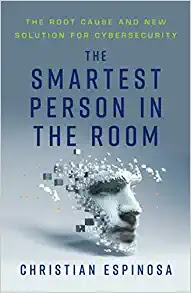https://www.amazon.com/dp/1544516215
The Smartest Person in the Room looks like an essential guide for modern businesses. Can you tell us a little about the importance of cybersecurity and what’s covered in the book?
Cybersecurity is one of those things that most of us do not think about until it’s too late. It’s important to understand the true risk with cybersecurity, so leaders can make informed decisions. One of the biggest challenges in cybersecurity is poor communication and egos. The cybersecurity industry attracts highly intelligent people that primarily get their significance from being smarter than other people. This shows up as intellectual bullying, posturing, and kiss-up/kick-down managers. My book addresses this root issue – the real reason why we are losing the cybersecurity war. My book, The Smartest Person in the Room, covers my experience with my own cybersecurity company, Alpine Security, and what I learned and applied with my team. The lessons I learned are centered around removing intellectual bullying and posturing by applying a 7 Step Secure Methodology. This methodology helps improve communication, empathy, teamwork, collaboration, and problem-solving.
How long did it take you to write The Smartest Person in the Room?
It took me nearly a year to write the book. I started in
February 2020 and finished around December 2020. As I was writing the book, my
thoughts on a few topics evolved and I almost got in a trap of wanting to keep
updating the book. I avoided this and just figured the new insights I gained
could become part of version 2 of The Smartest Person in the Room or a new
book.
What inspired you when writing The Smartest Person in the Room?
I decided in October of 2019 to write the book. I felt like
I learned a lot of lessons the hard way and that I had valuable information to
contribute. I wanted to help people avoid the same mistakes I made and help us
become better leaders of ourselves and others. I also knew that the
cybersecurity industry needed to change and rather than sit on the sidelines and
complain, I felt it was my duty, as an industry leader, to share my perspective
and drive the industry in a positive direction.
What will readers get out of your book?
The book is tangible and practical – not theoretical. The
concepts I discuss in the book are things that worked for me and my team.
Ultimately, my aim with the book is to shift people from uninformed optimism to
informed realism by empowering them with the tools they need to become better
human beings. After you read my book, you will be a better human being, so your
life will improve in many aspects.
Did anything stick out as particularly challenging when writing The Smartest Person in the Room?
The most challenging part was my realization of how I was a
part of the problem in the past – how I was the one intellectually bullying
other people and letting my ego get in the way. I also was quite nervous about
how the book would be received – I put myself “out there” by being vulnerable,
sharing a different perspective, and being authentic. This was challenging for
me. The irony is my book is about dissolving your ego, yet my ego was causing
me some doubt about the book. Your ego is not your amigo.
Can you tell us a little about your background?
I grew up in poverty in Arkansas. We lived in a small
trailer, were on welfare and food stamps, etc. My mother was addicted to
prescription medication and eventually overdosed. I worked hard to get out of
that environment. My childhood motivated me. I ended up getting a scholarship to
the United States Air Force Academy. I graduated from there and did
communications and cybersecurity in the military for 6 years. I then separated
from active duty military and went on to become a DoD contractor for many
years, where I traveled to different military installations to optimize and
secure networks. I worked for DHS as well and helped design cyberwarfare
scenarios. I then worked in the commercial sector to secure commercial aircraft
from hacking – from being hacked while in the air or on the ground. After that,
I worked as a freelancer for many years where I traveled the world teaching
cybersecurity courses and doing consulting. I started my company, Alpine
Security, in 2014 and sold it in 2020. I now work for the parent company,
Cerberus Sentinel, as a Managing Director.
Where can readers find out more about your work?
My website: https://christianespinosa.com/

